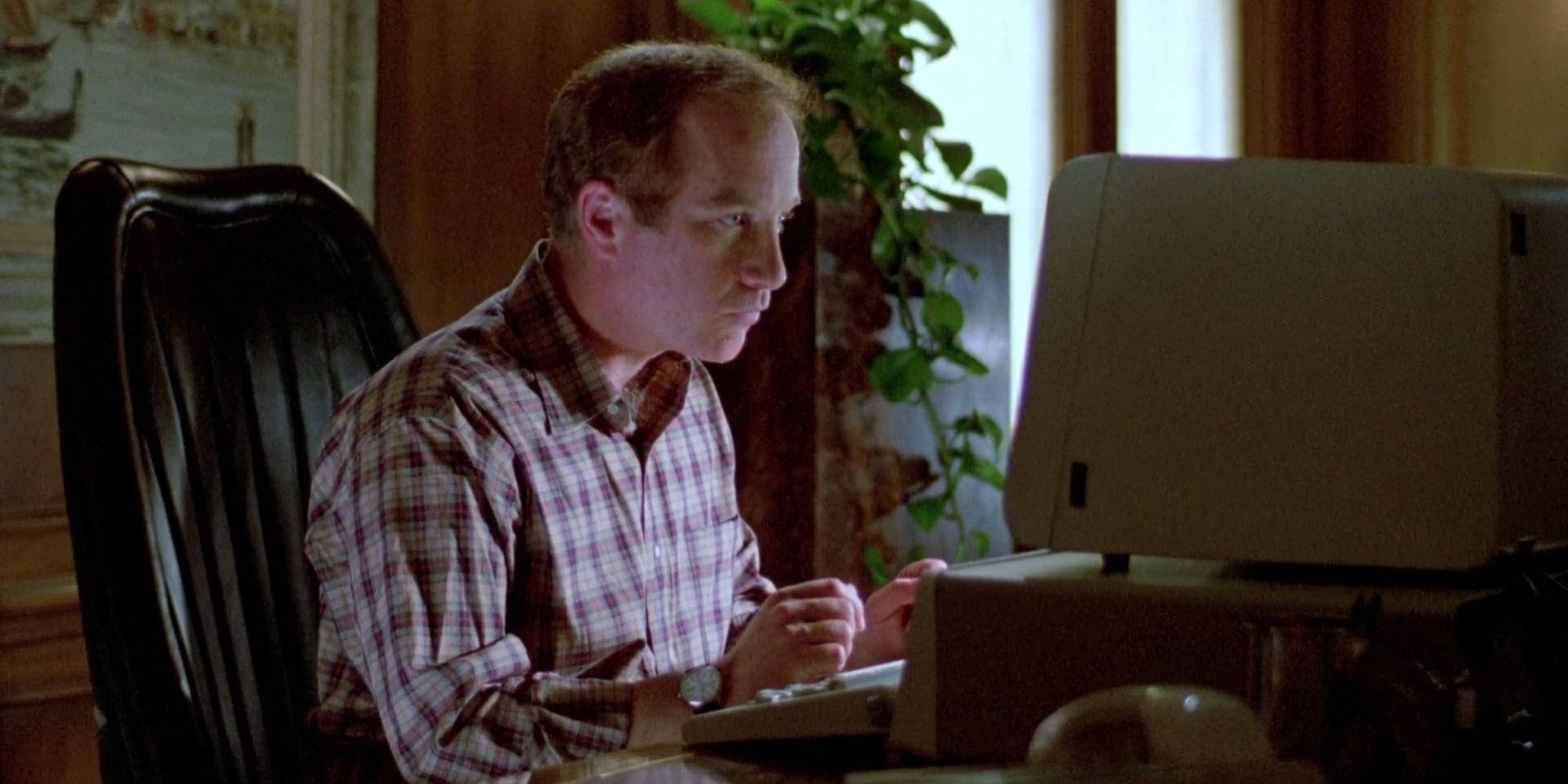The Big Picture
-
Stand By Me,
the film adaptation of Stephen King’s 1982 novella
The Body,
focuses on themes of adolescence, friendship, and loss. - While
Stand By Me
does deal with themes of death, the overall tone of the film is reflective and bittersweet. - King’s novella, however, ends on a much bleaker note. While the film establishes that Chris has died at the beginning of the narrative,
The Body
saves this reveal until the end. The ending of the novella also reveals that all three of Gordie’s friends are dead, not just Chris.
Stand By Me is one of Stephen King’smost personal and autobiographical stories. It moves away from the horror genre the author is well-known for and instead focuses on adolescence and friendship. Directed by Rob Reiner, the movie centers on Gordie Lachance (Wil Wheaton) and sees him reflect on his childhood, particularly a long weekend where he walked along the railway tracks to find a dead body with his friends Chris Chambers (River Phoenix), Teddy Duchamp (Corey Feldmen), and Vern Tessio (Jerry O’Connell). Although the movie deals with themes of loss and isolation, the overall tone is retrospectively hopeful, as Gordie is reminiscing on the good times he had as a child. However, the original ending of the novella Stand By Me is based on, entitled The Body, has a much bleaker ending. Gordie is still a writer, using his childhood experiences as material, but the tone is much more upsetting. Revealing what happened to his small friendship group just re-emphasizes that Gordie’s childhood is gone, and he will never get it back.
‘Stand By Me’ Is One of the Greatest Cinematic Tales of Friendship
Stand By Me succeeds largely because of the chemistry of the four leads. The naturalness of their interactions makes them feel like authentic friends. From their incessant teasing to composing the most vulgar insults about each other’s moms, it is clear the four of them genuinely enjoy each other’s company. Particularly, Chris and Gordie share a deeper bond and Chris shows concern towards Gordie’s future, something Gordie’s parents stopped doing after his brother Denny (John Cusack) passed away. Similarly, Chris shows how comfortable he feels around Gordie when he breaks down, recalling the story of how a teacher abused her position of power and spent the milk money Chris stole and tried to give back. Their dynamic indicates how their relationship is more than jokes and tomfoolery, as it is with Teddy and Vern. The pair really rely on each other for emotional support, and there is maturity to their friendship.
The movie also utilizes narration successfully, as it feels like more than just a device for relaying information to the audience. Throughout the runtime, there are interludes from the writer (Richard Dreyfuss), who is an older Gordie. It reminds the audience that this is Gordie’s story, creating a wistful feeling of nostalgia as he reminisces about his childhood. It also creates a clear distinction between the past and the present, reminding the audience that what they are watching is a recollection of Gordie’s youth.

Related
Y’all Need To Start Appreciating the Stephen King Thriller He Adapted Himself
What’s scarier than killer clowns and bloodthirsty cars? The person sleeping next to you.
The Ending of ‘Stand By Me’ Is Bittersweet
Right at the beginning of Stand By Me, it is revealed that Chris Chambers was stabbed in a fast food restaurant whilst trying to break up a fight, with an older Gordie staring out into the distance, clearly reflecting on his childhood. This tone continues throughout the movie, showing that Gordie is reminiscing on the time he had with Chris and how he valued their friendship. There is sadness that Chris is gone, but it is bittersweet as the pair had not been in contact for years. Gordie types that he will miss Chris every day — and the decision to have this written instead of spoken indicates this sorrow, that he almost can’t bring himself to admit that Chris is gone. The overall thesis is that childhood is the golden years, and you never have friends like the friends you had when you were twelve years old. Chris’ death allowed Gordie to remember that time of his life and finally immortalize it in his writing.
As for Vern and Teddy, they simply fade from Gordie’s life, but they are given fitting stories to offer closure to the audience. The movie recalls their futures in a way that reminds the audience that this is Gordie’s perspective — everything is slightly uncertain but sounds like it could be accurate. Although they aren’t a part of Gordie’s life anymore, there is a sense that they are still around and perhaps reflecting on that summer with the same fondness as Gordie. The movie then outlines how Chris and Gordie went to college together, and although Chris struggled, he worked hard and eventually became a lawyer. River Phoenix’s performance outlines the sense of injustice Chris feels towards the world and the hand he has been dealt. The ending feels hopeful as it shows Chris did get out of Castle Rock and didn’t fall into the stereotype that was expected of him. There is a steady finality about it, and while it is sad, it’s also contemplative.
How Is ‘Stand By Me’s Ending Different From Stephen King’s Novella?
Stephen King’s original ending for Stand By Me is a much bleaker portrayal of the instability of friendship. Chris’ death is not revealed until right at the end of the story, although the details are all the same. Keeping this information means the loss hits much harder than it does in the film adaptation. Seeing Gordie and Chris’ close relationship throughout the entire novella, which is similar to in the movie, only for it to be revealed that Chris is gone, is such an emotional gut-punch. It is not bittersweet and reflective like the movie — it’s painful, and Gordie struggles with the news. Even if Gordie in the movie is mournful over Chris, the film chooses not to linger on this, whereas Stephen King’s original ending really emphasizes the overwhelming feeling of loss. However, it is not just Chris’ death that makes the book so upsetting — all three of his friends have passed away by the time Gordie is finally writing his story. It is sudden and jolting at the end of such a free-spirited story. Although the boys were going to find a dead body, the core mood of the original story was still centered around the freedom of childhood before girls and responsibilities.
As abruptly revealed in the novella, Vern was killed in a housefire at “a large drunken party” where someone fell asleep smoking a cigarette. Gordie notes that Vern himself may have been asleep “dreaming of his pennies,” which perhaps will always be his lasting memory of Vern. King’s choice to include the detail that they identified Vern and his four friends by their teeth feels distressing and unfitting for the naivety that Vern exuded as a child. Teddy, meanwhile, “went in a squalid car crash,” his lifestyle leading up to his death, reflecting the likes of Ace and Eyeball. Teddy’s attempts to join the army and get out of Castle Rock make him sympathetic, and knowing he wasn’t given the ability to do so is disheartening.
Knowing that Gordie is the only one left of the group that the short story focuses on is deeply tragic. The mood doesn’t feel reflective as it does in the movie. Gordie’s sentiment in the novella that “my friends are dead but Ace is alive” represents the harsh reality of Castle Rock and the injustice Gordie feels. King reiterates that this story is a nostalgic tale of freedom, but reality catches up with everyone. Not only is Gordie’s childhood gone, his friends are gone as well.
Stand By Me is available to rent on Prime Video in the U.S.
Rent on Prime Video





